
25 minute read
Arable
| Arable PGRO TRIALS REVEAL SEAWEED -BASED BIOSTIMUL ANT INCREASES PEA YIELD
Field trials of 13 biostimulants on a crop of Combining Peas have shown that a seaweedbased product delivered a several benefits, including increased yield. Undertaken by the Processors and Growers Research Organisation (PGRO), the UK's centre of excellence for peas and beans, the trial results show that the use of Algifol delivered the highest yield. The seaweed-based biostimulant, which is marketed in the UK by MJP Supplies, produced an almost 3% increase in yield (2.94%) compared to the untreated crop. Aligfol was 11.3% better than the worst performing biostimulant, which actually reduced yield by nearly 3% (2.94%). The report also shows that the presence of foot rot infection was lower in the sample crop treated by Algifol compared to the control crop (0.6 and 0.7, respectively) Manufactured in Germany by NeoMedPharma, Algifol contains significant levels of trace elements, vitamins, enzymes, amino acids, carbohydrates, polyuronides and growth-regulating plant hormones. "The field trials were undertaken in Lincolnshire in 2020, following one of the wettest periods on record. The field had not recovered from the dreadful weather in 2019 and it was difficult for the grower to establish a good seed bed," says Marcus Palmer, director of MJP Supplies. "Despite the conditions, Algifol delivered several marginal gains, and in today's economic climate, these small improvements can make a big difference to profit levels and return on investment." The PGRO results show that Algifol generated 3.84 tonnes per hectare compared to 3.73 tonnes per hectare of untreated peas. Marcus predicts that this increase of almost 3% in yield (2.94%) could be worth as much as £40 per hectare to a grower. With the farming community increasingly interested in natural fertilisers and stimulants, Marcus believes it is interesting that the PGRO trial shows that ten of the biostimulants performed worse than the control crop. "The Government is very keen for pesticides that can harm the environment to be removed, which is driving an interest in biostimulants," says Marcus. "The results of these trials are quite worrying as they indicate that quite a few biostimulants can have a negative effect on crop health and yield. Thankfully, this is not the case with Algifol, which has increased the yield. "Every farmer is trying to increase their return on investment, and it's very pleasing to see that this field trial shows that Algifol will more than pay for itself if an application delivers a 3% increase in yield. "There is also the added benefit of Algifol being more concentrated than other biostimulants. This means you can apply less, and we have reduced the amount of packaging in which Algifol is supplied." As well as having a yield-enhancing effect, NeoMed-Pharma says its biostimulant also helps lower the crop's carbon footprint by improving fertiliser uptake through better rooting and improved photosynthesis, thus reducing leaching and losses to the atmosphere. Algifol can be used on all crop types, with MJP Supplies recommending a one litre per hectare rate of application via a knapsack, trailed or mounted sprayer. The product can be applied alongside most crop protection products. For more information about Algifol or to make a purchase, with a one litre can costing just £21.99+VAT, visit www.mjpsupplies.co.uk, call 07702 293 727 or email marcus@mjpsupplies.co.uk
OPICO has appointed Matthew Ashton as Maschio Territory Manager to cover Yorkshire, Lincolnshire, Nottinghamshire, Leicestershire, Northamptonshire, Buckinghamshire and Bedfordshire, adding strength to the Maschio Gaspardo sales team. A farmer’s son, Matthew joins OPICO with a strong agricultural background having studied agricultural engineering at Reaseheath College in Cheshire, before working for a series of agricultural dealers as both a demonstrator and salesman. Matthew is also a keen sportsman having only recently retired from club rugby. Commenting, Charles Bedforth, OPICO UK Sales Director said, ‘Matthew’s background in farming and his enthusiasm for the role make an exciting combination. We’re pleased to have him on board.’ On his new appointment Matthew said, ‘I’ve followed the OPICO brands for a while and I’ve sold the Maschio brand with my dealer hat on. This opportunity was too good to ignore. It felt the right time for me to move from a dealer to a machinery distributor and I am looking forward to my new role.’ Since joining OPICO, Matthew has been fully immersed in product sales training with Dominic Burt, Maschio Gaspardo’s recently appointed Product Manager. Matthew will be based from home near Holbeach, Lincolnshire and his contact details are: M | 07860 335228, E | matthew.ashton@maschio.co.uk

ADM Agricultur e Wheat and Oilseed Rape Market Repor t
A
s wheat prices come under pressure and fundamentals remain weak, the market will need a catalyst to spark a turnaround in sentiment. Market longs are staring at a huge old/ new crop inverse in prices. Given the size of the US carry and increasing freight rates, US prices are not enticing buyers, particularly as key international buyers’ own domestic harvests are only a matter of weeks away. US wheat prices have traded down a further $4-5/t over the past week due to the current sluggish sentiment and an improving new crop outlook. EU and UK prices have followed the global downward trend, losing €6/t and £5/t respectively. Spring sowing has commenced in the northern hemisphere, under mostly favourable conditions. Weather will now take greater importance as US plantings begin. The EU’s crop monitoring unit MARS reported winter grain crops in the EU are entering spring in fairly good condition and yields should rebound in 2021. Spring sowings are making good progress in Western Europe, particularly in France and Germany, both key producers. However, a drop in the planted area is expected from last season’s unusually high levels. Most regions in Ukraine will have optimal soil moisture reserves and near-ideal conditions for the start of spring sowing over the next few weeks. Australian farmers are scouring the market for crop-planting machinery, with many betting on back-on-back bumper harvests, buoyed by good moisture levels in the main growing areas. There have been some rumours that the Russian government is prepared to stop interfering in the regulation of grain exports when the market stabilises and will consider various other approaches to secure domestic supplies. Looking at more immediate events, Ukraine’s grain exports have fallen 23% so far this season to 33.4mln t, with traders exporting 13.9mln t of wheat, 14.9mln t of corn, and 4mln t of barley. Egypt purchased 360,000t of Romanian wheat in its recent tender, with offers oversubscribed, as traders believed this could be the country’s final tender for this season. Egypt expects to procure 3.5mln t of wheat from local farmers when the harvest starts mid-April, with current strategic stocks standing at a four- to five-month supply. China sold 2.26mln t of wheat last week at an auction of state reserves, continuing the strong demand from the feed sector, which is using the grain to replace pricey corn.

Potato gr owers pr epar e for yet mor e difficult har vests
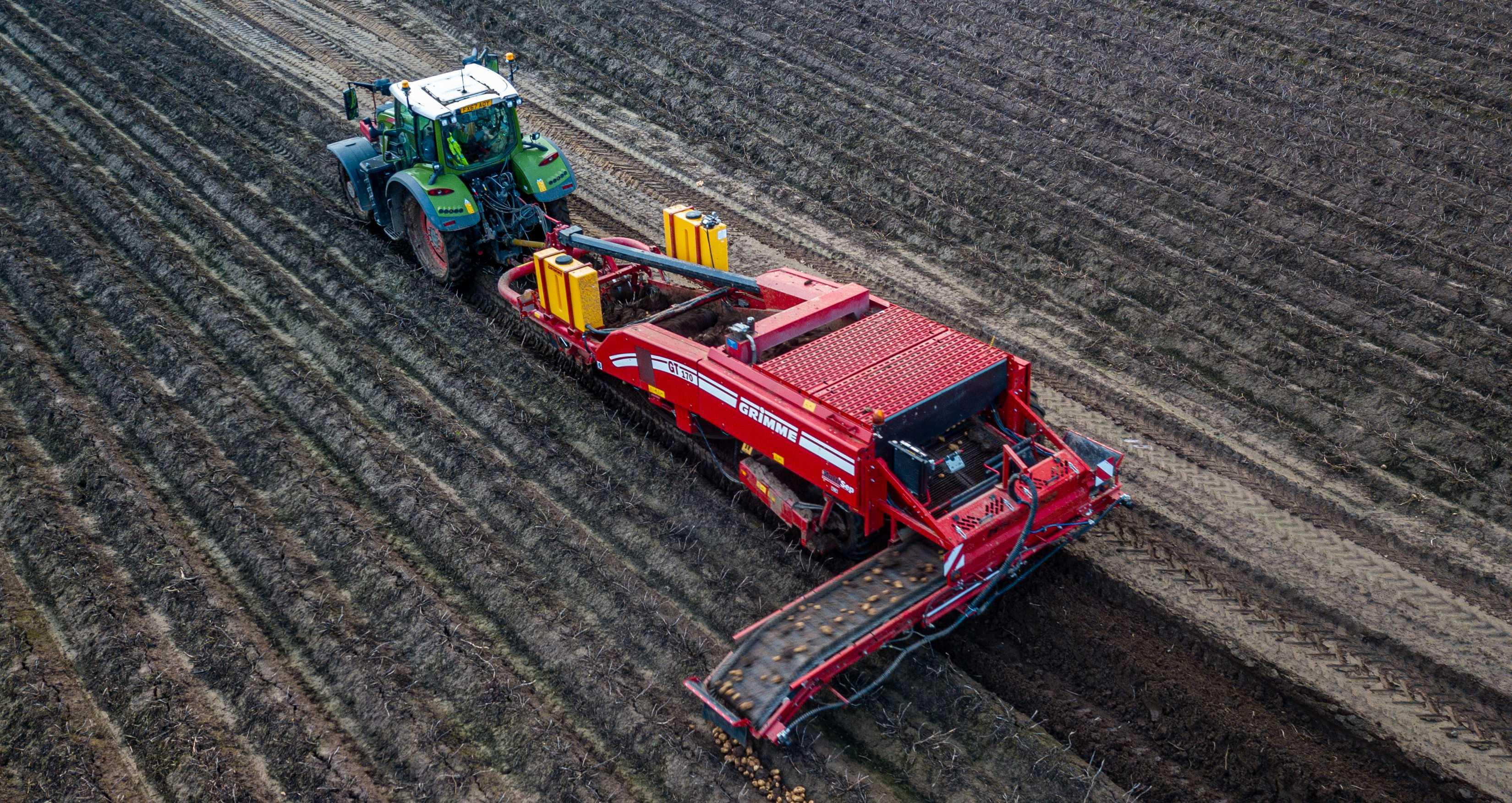
Scotts report a significant surge in Windrower kits and “Retro fit” Evolution separator sales. With the potato industry having to adapt to a host of market changes and an increasingly changing weather pattern, potato growers have been looking seriously at their wet weather harvesting capacity.
“Over the last 8 years or so we have seen an increasing number of growers leaving crop in the field and at times here in Lincolnshire as much as 50%. Almost all growers have lost some crop over the last decade due to adverse weather now being the norm.
Having been in the industry for almost 40 years working with relatively basic harvesting machinery compared to these days, I am staggered that we seem to have gone backwards in managing our potato lifting. Of course the weather is the primary factor, and most of all the relentless topping up of rain in already saturated fields. Whilst we cannot control this, we can prepare better for future harvests both in the field and store. Increasing lifting capacity is an obvious one with many more of the larger growers now adopting self propelled harvesters and more recently the addition of windrowers. The latter providing a significant benefit when opening out fields in wet conditions”
The latest Grimme GT170 extended cross conveyor conversion allows up to 8 rows to be gently lifted and deposited into adjacent rows without moving the crop twice, creating plenty of space for the following harvester and trailers to operate without fear of “nipping” the unlifted rows and eliminating the need for an opening out trailer with narrow wheels, It is universally accepted now that windrowing correctly will reduce damage overall (by filling the sieving webs and reducing roll back). Furthermore the windrower generally lifts more crop per day than the harvester, for 2 main reasons. The windrower never has to wait for trailers to be in position and can start sooner in the day to create an opening yet only needs to be a few yards ahead at the end of the lifting period. Off the back of another challenging lifting season there has been a real surge towards upgrading in-store equipment too with a distinct focus on better cleaning. “We think there is a 2 fold driver behind this. In the first part its really about dealing with high soil and clod content, inevitable when we are lifting in extreme conditions but Its also about those marginal days where lifting is going reasonably well but you might be only performing at 70 or 80% of capacity from the grader. Our customers are asking for the ultimate in cleaning systems to make every day as close to 100% efficient as possible. These days we fit much larger systems in graders with 6 and 8 rows common place and the occasional 10 row where space allows. We offer a full turn key solution ourselves here in Boston and through our dealer network. The investment cost of a high performance cleaning system compared to the value of crop in the ground negligible. Yet quite possible the most important part of the chain and certainly the most labour saving and definitely worth some consideration” Scotts Precision Manufacturing Ltd can be contacted anytime; Office 01205 270 128 Email sales@scottsuk.com

New Quantis gives r elief to heat-str essed potatoes

Syngenta has launched its first biostimulant in potatoes, Quantis, that has shown to effectively help crops cope with the impacts of heat stress. Following the UK’s most extensive research field trial of a biostimulant, analysis of the huge data resource has revealed significantly increased yield for crops that had been under prolonged or extreme heat stress. The results indicate that Quantis can have an important role in potato agronomy programmes from tuber initiation, through the crop bulking phase. Its value is even more apparent with the increasing incidence and severity of heat events in the UK, reported Syngenta Head of Technical, Dave King. Quantis delivers a readily available blend of organic carbon, amino acids, potassium and calcium that supplement the plant’s own molecular cell function, he pointed out. “Acting directly as an anti-oxidant it can help to counter reactive oxygen species (ROS - free radicals) that can cause significant damage, particularly within the foliage if leaves get too hot,” advised Mr King. “It is believed to activate and enhance the potato plant’s natural capability to adapt to heat stress, to prevent damage.” He explained that the strength of Quantis lies in its relatively high proportion of short chain carbon molecules, which are particularly effective at helping the plant to prevent the creation of ROS during periods of stress. Furthermore, it helps with the scavenging of accumulated ROS, to minimise their adverse effects. “By filling the organic carbon gap when a plant comes under stress it can act to minimise its effects,” he advised. Quantis also contains a level of amino acids that can help to protect plant structures from nitrogen and protein degradation when under stress. Furthermore, Quantis also provides osmoprotectant regulators to help plants manage cell osmosis, which could help contribute to the heat stress mitigation. Whilst other biostimulants, typically with higher amino acid content, may have an earlier role for plant development, the greater understanding of how Quantis works has highlighted its position for stress prevention through the season, he advocated. The highest returns in tuber yields were generated from three applications of Quantis at 2.0 l/ha, applied from tuber initiation through the bulking phase. Application trials had shown it was fully compatible for tank mixing with all the blight fungicides tested.
Reporting results of the extensive Quantis trials last season, Mr King outlined that of the 32 sites experiencing conditions of greater than 25⁰C for more than four hours through the application window, yields were an average 2.2 t/ha greater. The 14 sites that experienced a heat event in excess of 30⁰C over that period recorded an average 1.9 t/ha yield increase. In previous years of Quantis trials, the greatest effects on yield and tuber size were recorded in 2018, which coincided with an extremely hot and stressful growing season, he recalled. “It was notable from in season assessments that effects were apparent in the second phase of tuber bulking, when the crop came under extreme stress.” Reviewing historic weather has shown the variability in heat events from season to season and location, but at some stage most crops will be subject to some effects, he warned. Furthermore, as climatic conditions have changed over recent years, extreme and prolonged heat periods are becoming more frequent Continued Syngenta field research in 2021 will look at refining application timings, he reported. More controlled trials will also seek to tease out differences between varieties and other variables, such as irrigation and crop duration. Syngenta’s New Farming Technologies team is pioneering predictive heat forecasting models, with the aim to identify potential for precision targeting of applications prior to stress periods in the potato growing season, along with some other crops. New Syngenta research funded at Nottingham University will also lead an in-depth investigation into how Quantis is working to alleviate heat stress and drought effects within potato plants. Quantis will be available for use in the 2021 season.
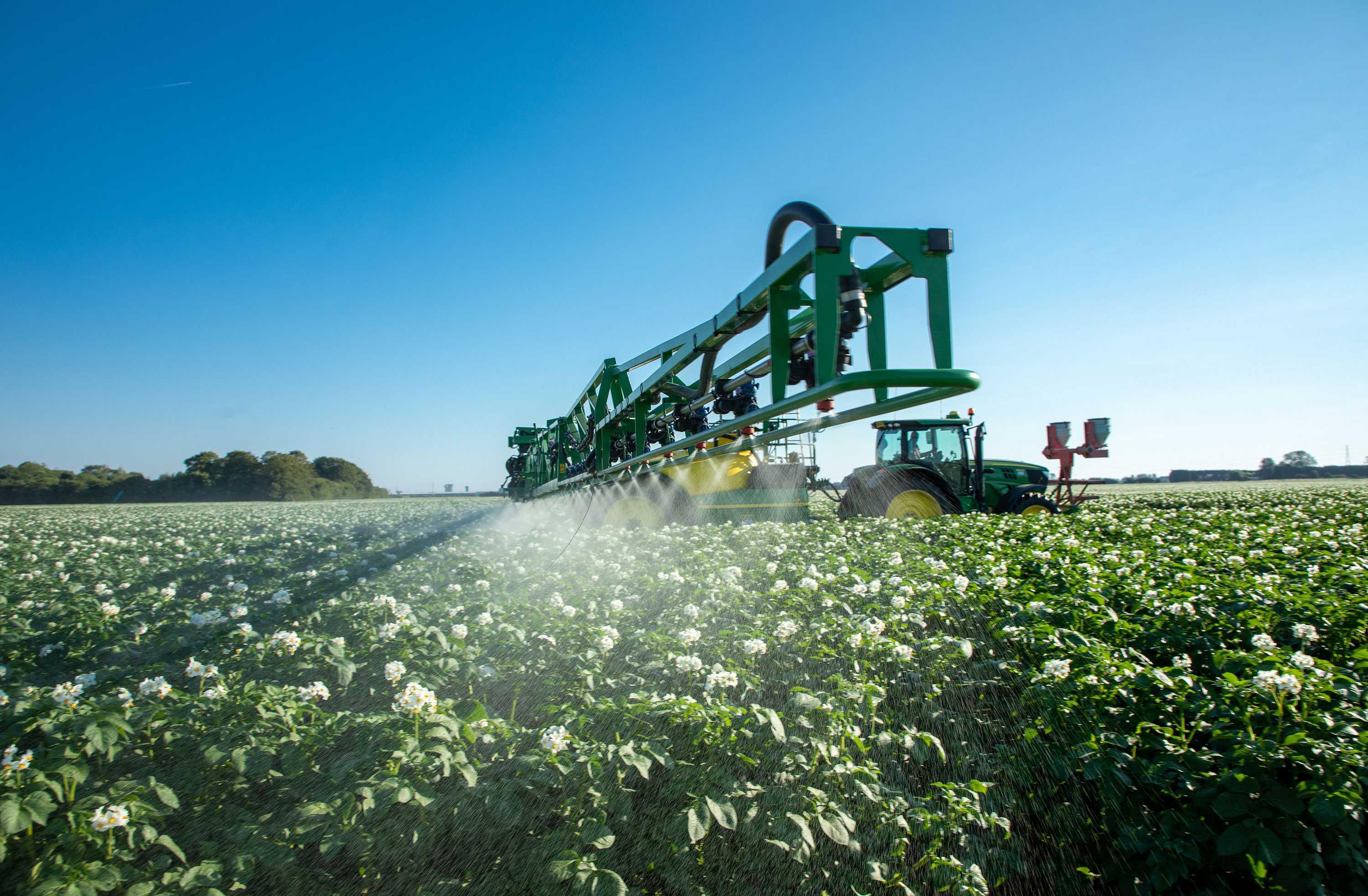

A new vision for high quality onion sor ting at Elveden
Aturnkey optical onion sorting line featuring a collaboration between UK vegetable handling equipment manufacturer Tong Engineering, and French machinery manufacturer MAF Agrobotic, has enabled leading UK vegetable producer Elveden Farms Ltd to minimise labour requirements whilst increasing capacity and yield across its onion processing operations. Based on the Norfolk/Suffolk border, Elveden Farms markets over 45,000 tonnes of onions each year to the supermarket, wholesale and processing sectors, handling up to 300 tons of onions per day. Andrew Francis, Farms Director at Elveden Farms explained; “Our requirements for the new optical sorting line were very specific. We employed an independent, specialist consultant to research the market and determine the optical sorting machine that would provide the highest quality results on our onion crop. As the UK distributor of MAF Agrobotic equipment, Tong presented the optical sorting capabilities of MAF, which could be integrated within a complete Tong line. Working closely on the project with Tong and MAF for almost 2 years, performing many tests with Elveden onions, it was clear that the turnkey optical sorting solution they could offer was going to be the best. We were very impressed by the scale of MAF Agrobotic expertise and development resources which provided confidence that the bespoke solution would fulfil our current and future requirements.” The new optical sorting line at Elveden features custom built infeed equipment from Tong, with a focus on effective topping of onions to ensure the best presentation of crop to the MAF sorter, for optimum sizing and defect sorting. For maximum flexibility, the Tong design includes both conventional fan topping alongside scroll topping equipment with bypass options. Once the onions have been received and topped, MAF’s flagship optical sorting machine, the Pomone, weight-grades crop as well as externally and internally sorting. The 10lane model of the Pomone is capable of sorting over 30 tons of onions per hour at an average onion weight of 130 grams. The proven MAF Pomone sorter features high-performance optical sorting technology. The G7 is MAF’s exclusive LED external optical sorting system, which uses cutting-edge imagery to detect any blemishes or defects to the onion’s skin finish. Its ability to identify blemishes on both white and red onions is a unique, unrivalled attribute of the MAF Pomone. In addition, highly efficient artificial intelligence algorithms can be used to allow the G7 technology to progressively learn defect specifications for even better categorisation. The G7 camera system rapidly captures multiple images of each onion, enabling extremely accurate and consistent external sorting. This, coupled with accurate size grading ensures nearperfect sizing of crop. Even more impressive are the internal defect detection capabilities of the MAFdesigned and patented IDD8 internal defect technology (previously IDD4). The IDD8 detection system effectively identifies internal defects within the onions including accurate detection of translucents, base rot, neck rot, fusarium rotten core and several other internal issues. Any internal defects
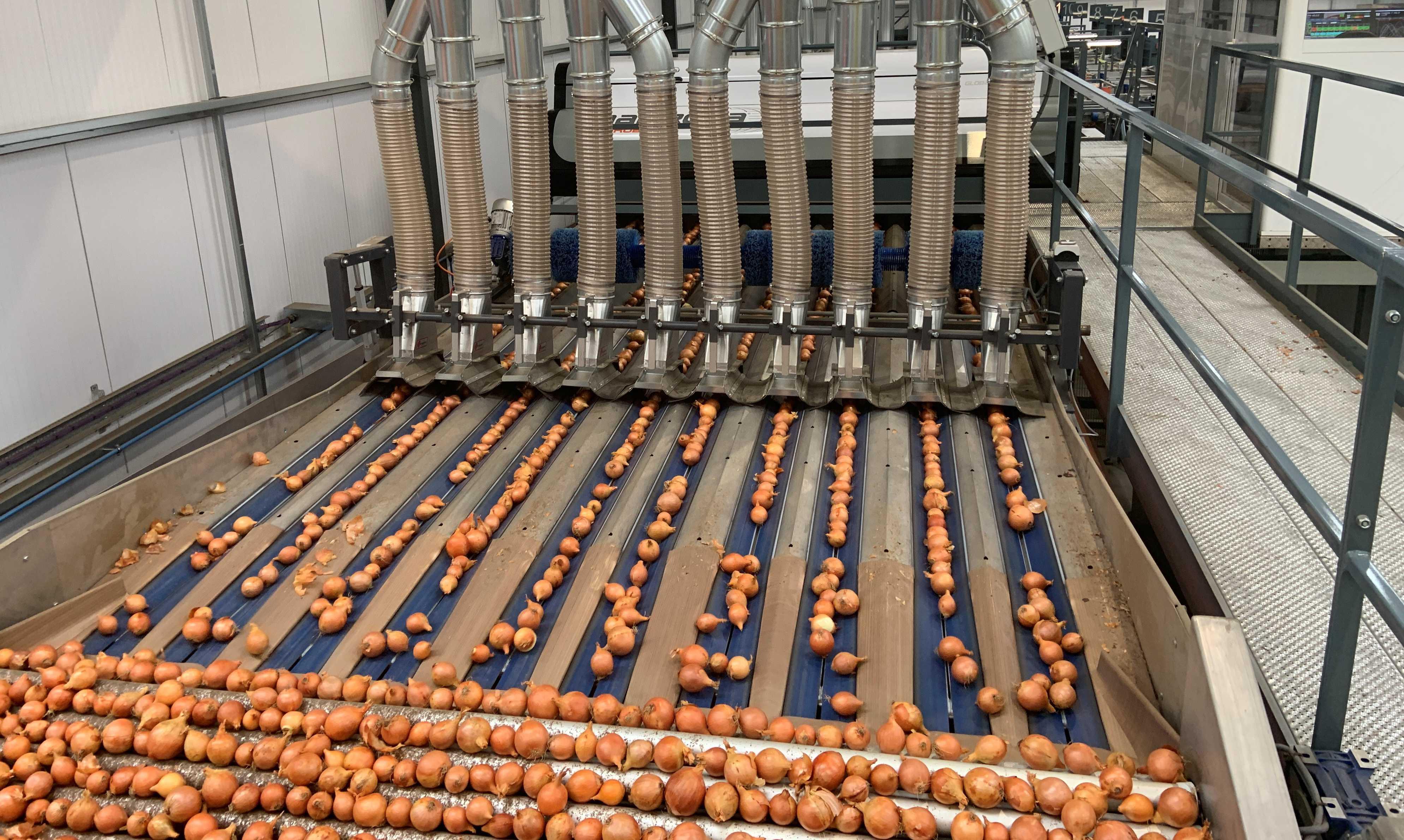


within the load are easily recorded and directed to the correct outlet. The new and advanced IDD8 is very easy to use and is managed from a user-friendly interface connected to MAF Ophea software, which is seamlessly integrated with Elveden’s ERP system for detailed data management. In addition to this advanced MAFexclusive internal and external optical sorting technology, the MAF Pomone also uses Insight 2, which is a halogen, near infra-red optical sorting system like those more commonly known and utilised throughout the industry. “The unique MAF external, and particularly internal optical defect technology sets the MAF Pomone sorter apart from other optical sorters on the market, detecting defects that are not visible with standard optical vision,” explains Charlie Rich, Sales Manager at Tong Engineering. “Our long-standing relationship with MAF allowed us to work in close partnership to design and manufacture a completely bespoke optical sorting facility for Elveden. It incorporates state-of-the-art handling technology to ensure the most advanced and automated processing, with minimal labour requirements.” Of the new optical sorting solution at Elveden Farms, Andrew added, “We have significantly reduced the number of inspection staff required to process our onion crop, so much so that for some customers we are able to process their onions without any inspection staff on the line. The MAF sorter has noticeably increased our throughput and our yield of saleable onions. We are now able to sort crop so effectively that we are often saving good onions that may have previously gone to waste. This means we are utilising our crop more efficiently than ever before, knowing that the right crop is directed to the right outlet for sale.” MAF Agrobotic export sales manager, Vincent Boulbes confirmed how pleased the team at MAF have been to see the optical sorting project at Elveden come to fruition. “We are delighted that Elveden chose the optical sorting solution from MAF and Tong. Elveden’s independent consultants evaluated all options for onion grading currently available on the market and identified MAF as the best supplier for a robust and reliable optical solution that offers superior inspection of crop that meets the high standards of UK retailers. The intense development work that our team of engineers have dedicated to ensuring highly effective onion quality sorting has really paid off.” The MAF management team are also very proud of the latest onion installation. Fabrice Blanc, MAF Agrobotic General Manager and Director of MAF South Africa, has acknowledged MAF’s commitment to continuous development of their onion grading capabilities. “We are very grateful to the team at Elveden for their involvement in the project. We worked closely together to identify the capabilities of the MAF optical sorter on onions. MAF considers the trust and close relationship we have developed with Elveden very highly. With a focus on innovation and reliability, MAF will continue to develop new solutions in onion grading for the highest standard optical grading. MAF’s success with Tong in the UK will help to lead the way in expanding this market throughout the world including in the USA, Europe and South Africa, where I work closely.”



Liquid fer tiliser offers sustainable choice for potato gr owers A recent trial in potatoes has shown that using smart liquid fertilisers can significantly reduce the amount of phosphate super phosphate (TSP) measuring yield repone and quality of Maris Piper potatoes.” The trial results showed no significant required to generate one tonne of yield difference in yields from the plots when compared to traditional granular grown with the farm standard TSP fertilisers. and the liquid fertiliser when applied at planting, but the total amount of Carl Gibbard, Agro-Vital technical phosphate used to generate each manager, explains this insight could pay tonne of potatoes was drastically dividends as growers plan their crop reduced when using the liquid starter nutrition programme for the upcoming fertiliser. season and seek more environmentally sustainable products. “In the farm-standard TSP plots, 3.56 kg/ha of P2O5 was required for each going to be a really important“The healthy establishment of potatoes tonne of yield. Whereas the potatoes consideration for growers over the nexthas significant effects on the final yield a grown with P-Focus liquid fertiliser only few years particularly in light of ELMsgrower can achieve. Therefore, needed 0.28 k/ha of P2O5 per tonne of and rising input prices.delivering the right nutrients to the plant yield which shows a significant at the right time, particularly phosphate, reduction,” explains Carl. “Having options such as P-Focus on the is incredibly important for the success of market will be invaluable for growers in a potato crop,” says Carl. “This difference highlights a reduced order to combat the day-to-day farmneed for high volume applications of pressures they face and will allow“Our 2020 trials, carried out in fertilisers which can help growers to farmers to adopt a more sustainablecollaboration with Oxford Agricultural save both time and money. approach to farming while still producingTrials (OAT), looked at exactly this – the efficiency of P-Focus, an NPK liquid fertiliser, against a farm-standard triple “Choosing effective and more sustainable fertilisers for crop nutrition is a high yielding, quality crop,” he concludes.

While an official opening might not be possible, the team at GRIMME UK's new £3m depot have still found a way to celebrate supplying the 2000th GRIMME destoner to one of the country's leading vegetable growers. A month after moving into the Market Weighton depot, GRIMME UK has supplied a milestone CS 150 CombiStar separator to one of Yorkshire's largest root vegetable growers. The CS 150 Combi-Star, which features a unique mix of star rollers and main webs to deliver excellent stone and clod separation, was sold to MH Poskitt and was the first separator to be received by GRIMME UK at its new 15,000 square feet depot. Like all of GRIMME's machinery, the CS 150 Combi-Star was manufactured in Germany but received by the team at Market Weighton for pre-delivery inspection and customising to MH Poskitt's exact requirements. Poskitt's, which grows, washes, packs, and distributes carrots, potatoes, swedes, parsnips and pumpkin for supermarkets, will use the de-stoner on its Yorkshire farms. "It's fitting that this milestone machine should be the first separator to leave our new Market Weighton depot," says Patrick Graf Grote, Managing Director at GRIMME UK. "It was a real surprise to us all to see that the serial number indicated that this was the 2,000th CS 150 Combi-Star to be manufactured,


and it is great to see it going to one of the UK's leading vegetable growers and a long-standing local customer for GRIMME UK." The CS 150 Combi-Star offers 25% more sieving capacity than traditional systems due to the highly efficient and powerful patented RotaPower shaft, which crumbles the compacted soil and prepares it for increased sieving. The RotaPower shaft also significantly reduces the wear and tear of the star rollers and main web. GRIMME has also incorporated a robust V-belt drive into the CS 150 Combi-Star to ensure low maintenance costs. "We have some very stony and cloddy fields in Yorkshire, so wanted a machine that could perform well. We already own six GRIMME de-stoners and they never let us down, that's why we went for GRIMME's CS 150 Combi-Star," says James Bramley, Farm Manager Vegetables. "As always, GRIMME UK has customised the machine to suit our exact needs, and now they are just down the road it will be very easy for us to have the machine serviced and to get hold of spare parts when we need them. The fact our machine is the two-thousandth one to be manufactured shows what a great piece of kit the CS 150 is!" GRIMME UK relocated to the Market Weighton site in the middle of February, following 11 years in Dunnington, near York. A significant increase in both the size of the GRIMME UK team and the number of customers the company is supporting, combined with the need to hold more stock and have space to work on larger machines, meant the company simply ran out of room. "Our new purpose-built, state-of-the-art depot means we can carry probably the largest stock of replacement webs in the North of the country. We can also easily undertake servicing and repairs on machines of all sizes - from the smallest to the largest. And, when circumstances allow, we will be able to welcome groups for operator training and refresher courses on our machines," adds Patrick. For more information about GRIMME UK, the CS 150 Combi-Star and the broader range of vegetable harvesting machinery, please visit www.grimme.com/uk
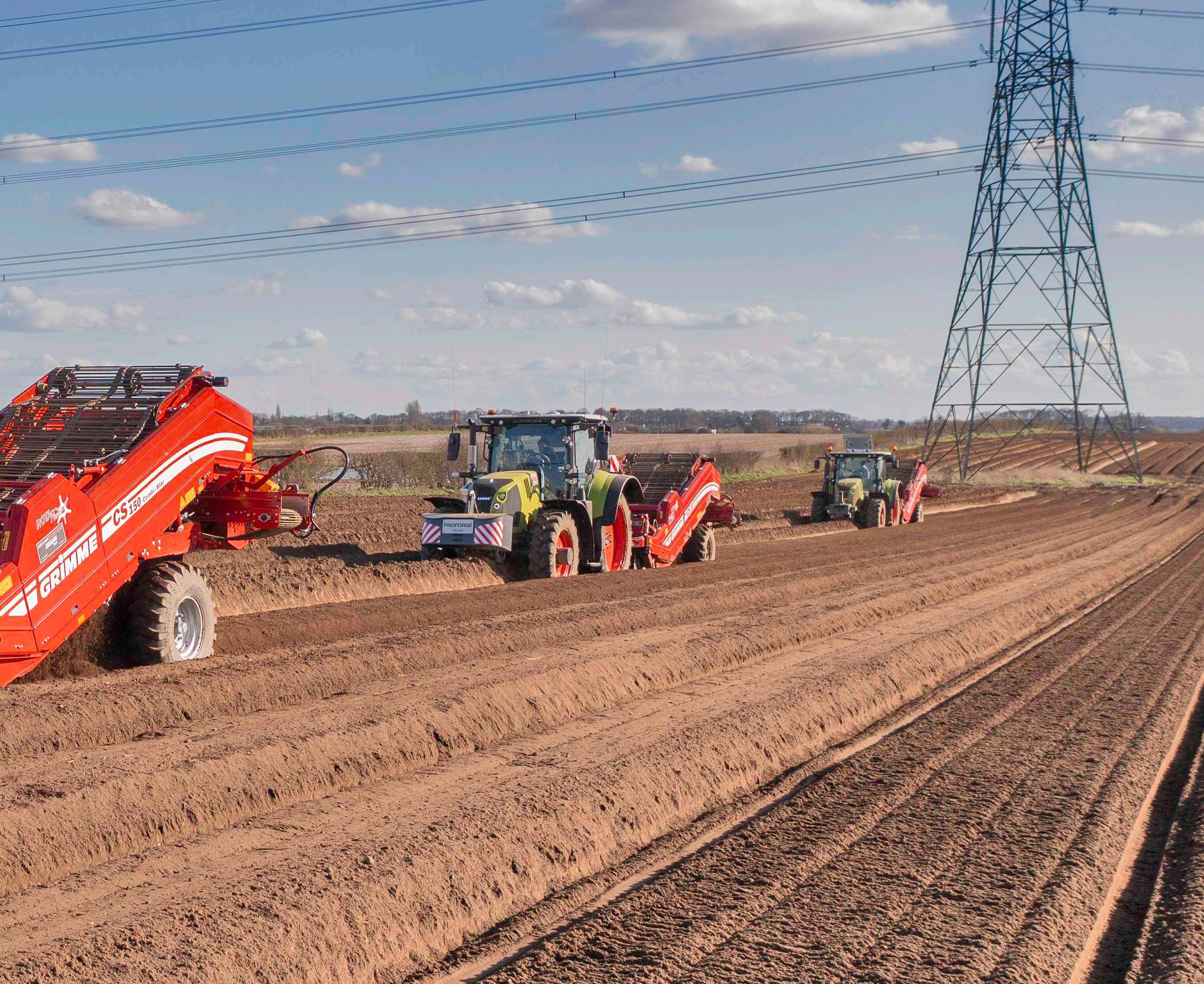


What do you look for in your chosen grain handling, dr ying and storage manufactur er?

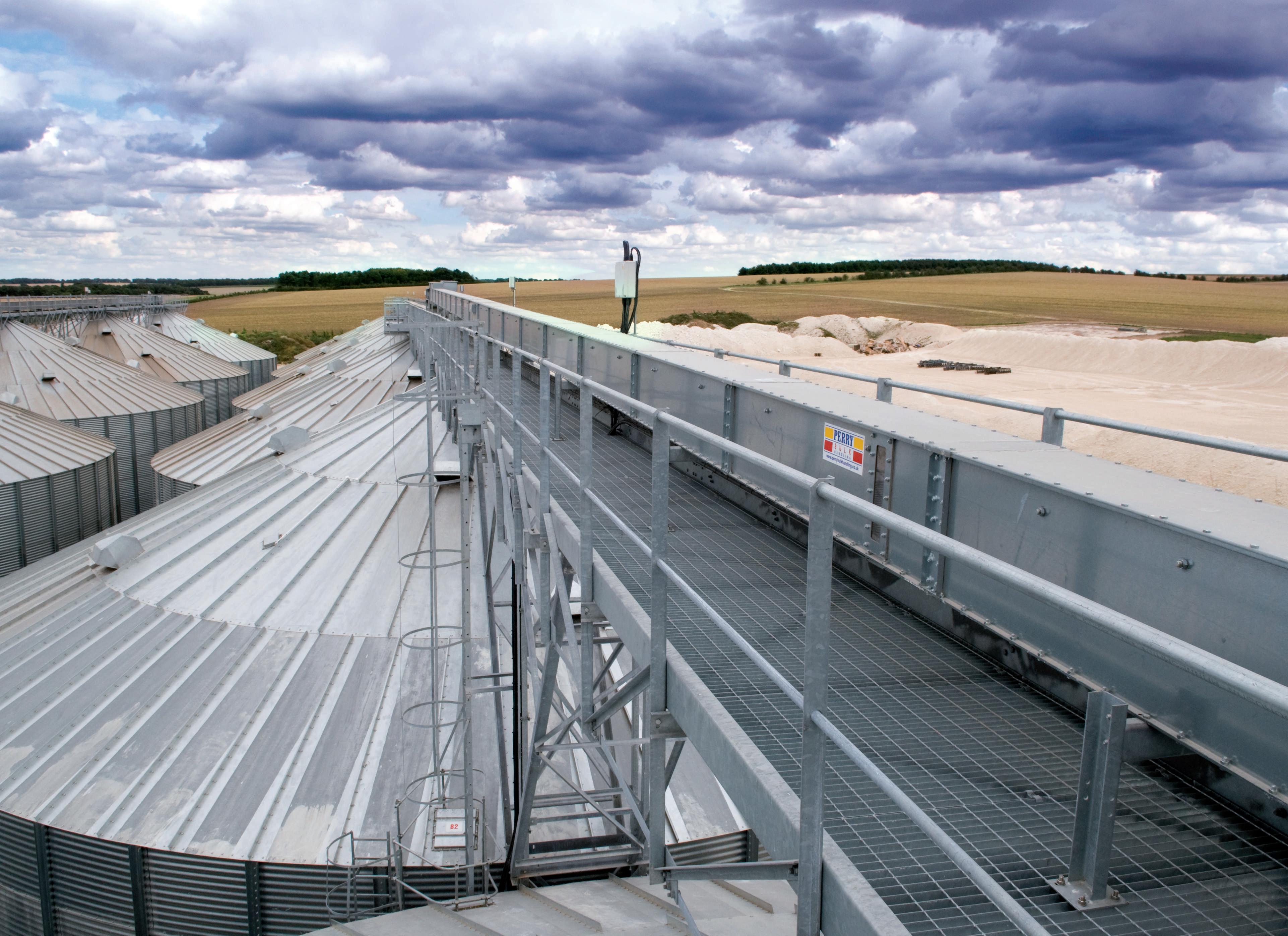
Is it a company that has been a specialist in grain handling for 70+ years so fully understands your needs? Is it a company that understands the importance of specifying machines that are built to last multiple harvests and not just ones that meet your budget but then need replacing very quickly? Is it a company that’s fully based in the UK with a decent level of spares and stock so can respond quickly when needed? Then Perry of Oakley Ltd. tick all of those boxes. We have numerous stories of Perry manufactured machines from the 1960s that are still in active use and we still provide spares for. We often do rapid turnaround on breakdowns even on Sundays if that’s what is needed to keep our customers going. We even offer a 10 year guarantee on our up to 60tph agricultural range of machines against trough perforation because we know we build them to last.
Perry of Oakley Ltd. specialise in manufacturing a full range of handling, drying and storage to meet all requirements from smaller farms through to large grain stores. To meet a range of needs there are two drier models available: the entry level “Mistral” and the top specification “Savannah” series. Both driers have Perry’s own advanced touch screen PLC panel, which can be linked to any smart phone for full control of the drier from any location. Perry also provide fire detection systems that can be retro-fitted to any make of drier, giving you vital early warning of fire helping you reduce the damage to the drier and surrounding plant. The system can be stand alone or integrated into your control panel. In the handling range, Perry manufacture and supply a full range of handling equipment including chain & flight conveyors, aspirator pre-cleaners, belt & bucket elevators, belt conveyors, U-trough and tubular screw conveyors, which come in three different performance levels: industrial (1501000tph), light industrial (60-150tph) & agricultural (8-60tph). The extensive silo range includes flat bottom & hopper bottom silos from 3m to 32m; storage capacities from 27m³ to 26,000m³. The silos are manufactured on state of the art equipment and can be specified to meet either ANSI or Eurocode standards. Perry regularly handle jobs as small as a single conveyor up to full greenfield plants by working with an extensive range of dealers throughout the UK. The Perry sales and technical support team have over 450 years of industry knowledge. That combined with their 70 years experience in manufacturing of handling, drying & storage equipment, make Perry of Oakley Ltd. the supplier of choice. They have won several awards for being one of the top companies in the country and also from SHAPA which demonstrates their performance in the sector. In this new period where parts and machinery entering the UK from Europe are less certain and more costly this is the best time to choose the UK’s most experienced manufacturer for your handling, drying & storage equipment. Contact Perry today for all your handling, storage & drier requirements on +44 (0)1404 890 300 or email sales@perryofoakley.co.uk, and receive a free, no obligation quotation..











